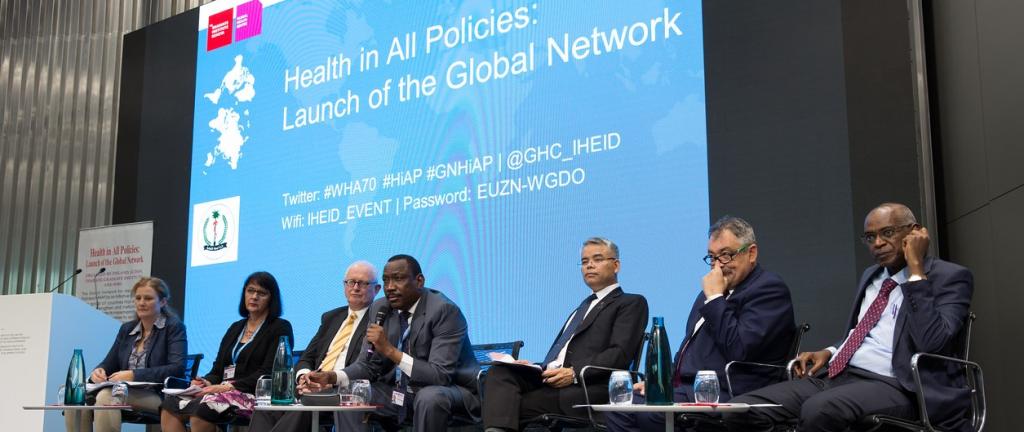“We cannot afford to spend money on treatment, so we need to ensure prevention by integrating Health in All Policies” was the consensus of the World Health Assembly side event organised by Sudan, WHO and the Global Health Centre on 24 May 2017 at the Maison de la paix.
The panellists from five countries and regions and WHO, moderated by the Minister of Health of Sudan Bahar Idris, discussed the lessons learned and future challenges of their experience in Health in All Policies (HiAP).
By focusing on the various social, political, environmental and economic factors impacting health, the HiAP approach reflects the spirit of the Sustainable Development Goals (SDGs). As stressed by Dr Abdalla Osman from the Ministry of Health of Sudan, such a vision “ensures long term agendas and consolidates social capital while fostering a healthy, involved and productive population”.
The implementation of HiAP requires strong political will. A flexible and adaptive approach to HiAP helps in aligning health agenda with other government priorities, and adapting to the changing political environment locally and globally. While working with several different government agencies – and often with scarce funding – it is crucial to create win-win outcomes through co-policy design between different sectors. Taru Koivisto from the Ministry of Health and social Affairs in Finland underlined that this allows governments to see HiAP as delivering health and wellbeing for all, and not merely as “health imperialism”.
Decentralised states pose particular challenges in integrating HiAP at different levels of government. In this regard, Paddy Phillips, representing South Australia emphasised the positive effect of a central government mandate to implement HiAP in federal states, which allows for, and also demands, comprehensive action at the state level.
In all countries, successful implementation of HiAP also requires moving beyond the government level and working with the local communities and civil society. In Thailand the National Health Assemblies, which are participatory forums for multistakeholder consultation, allow “scaling up local wisdom into the national level”, Weerasak Putthasri explained.
The panel concluded by launching the Global Network for Health in All Policies, which aims to accelerate HiAP by the sharing of both successful and un-successful experiences between the participating countries. In addition, peer pressure, successes of other countries, and new expertise from abroad can be effective in motivating governments to take action on HiAP. As noted by Nicole Valentine from the WHO, the network can also facilitate the use of the various tools and evidence the WHO provides, and which are currently underutilised by member states.
The Global Health Centre as a WHO Collaborating Centre on Governance for Health and Global Health Diplomacy is actively supporting the creation of the network and a first network meeting among the wide-ranged membership is planned in fall 2017 to set sights for their first 4 year working plan. The value of a network as a source of support, evidence, best practices and peer pressure was clearly recognised. “People say that it’s the power of love, but I say it’s the power of a network”, Horacio Arruda from the Government of Quebec in Canada concluded.
A vieo of the event is available to watch here.


